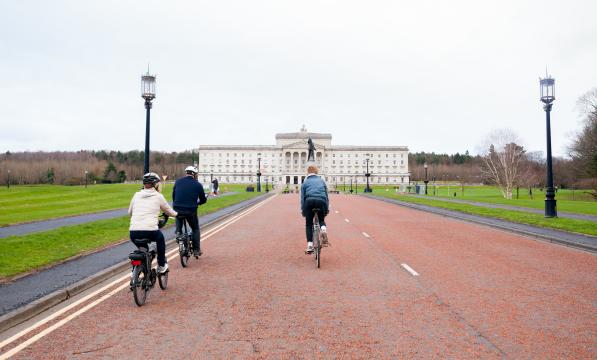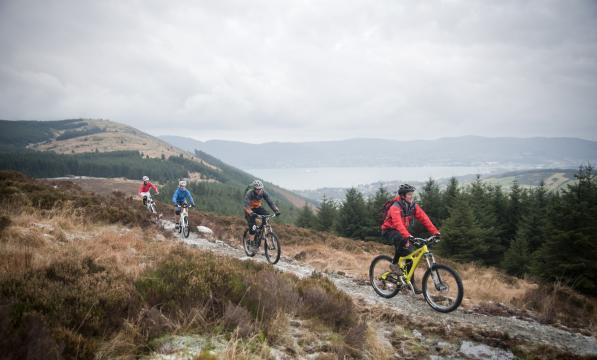Error message
No matching provider found.Cycling to work in Northern Ireland
Cycling to work in Belfast and Northern Ireland has its own unique set of bonuses: some of the beautiful scenery around the Lagan River and Belfast Lough, the Greenways of East Belfast surrounded by nature and the feeling of uniqueness of being part of the 1% of journeys taken by bike.
Commuting in Belfast also has its own unique set of challenges: the lack of safe, connected routes, the potluck of whether your employer has bike lockers and showers, the difficulty of cycles on trains during peak times.
In one part of Belfast, the Linen Quarter, Cycling UK has been working to overcome these challenges and encourage more people to cycle to work.
What route should I take?
If you live in a part of Belfast where you have a safe cycle route to town then you’re one of the lucky ones. Much of south Belfast has access to the Lagan Towpath, and east Belfast has two beautiful routes in the Comber and Connswater Greenway.
If you live to the north, west or further out however, you will find it much harder to find a cycle route away from the roads.
The Department for Infrastructure has a Northern Ireland Cycling map with various types of cycle routes marked, it’s a good place to start when planning your commute – remember, the shortest route is often not the best.
You can also try Cycling UK’s Journey Planner which can help you find the quietest or most direct way to where you want to go to.
Hire or to buy?
If you’re new to all this and don’t have access to a cycle then its not a bad idea to use Belfast Bike hire, sadly no e-bikes (yet) but the current fleet are worth a go and are placed at various locations in the city centre and inner suburbs.
To hire them simply download the TIER app on your phone, register, find a bike near you and you’re off.
If you’ve tried it out and think cycling is the way for you then I recommend buying your own bike, it’s likely to be lighter, cheaper in the long run and less hassle trying to find and dock around the network.
Your choice in cycles is pretty much infinite and very much depends on your use, but its important to remember a few key factors.
- Folding or non-folding: this is especially important if you are one of the ‘train-cyclists’ more common on the continent. Translink, which operates public transport here has a no-bikes rule before 09.30 on trains, and a four-bike maximum per train rule. However, there are no restrictions on folding bikes – they can be taken on trains any time. The other benefit of going for a ‘folder’ is that it is easier to store at home and to get in a car boot. If you have a long or hilly commute, however you may find your heart and lungs get quite the workout on a folding bike with the smaller wheels!
- Size: the most important part of buying a bike is that it is comfortable and the right size for you, always test ride your bike first to get a better feel and ask any bike shop for advice on what would suit your needs best.
- Luggage: if you’re commuting to work on the bike it’s likely you will want to carry your work bits and bobs. Backpacks are great on a bike but can feel heavy and lead to a sweaty back no matter what time of year. I always recommend either panniers or a bespoke bag such as on the Brompton Bike, it makes it nicer to cycle, holds more weight and means there’s no need to change when you get to work.
The weather
A key feature of Northern Ireland life is the weather, complaining about it, saying ‘it’s worse than last year’ every year and ultimately using it as an excuse to hop in the car rather than walk (or cycle).
Well we’re going to tell you that it’s not that bad! Local campaigner NI Greenways actually tracked a year of commuting showing how rarely you get wet – so, while it does rain a lot, it rarely rains all day and you’re almost never caught in it.
One of our big tips for commuting in Northern Ireland is ponchos also known as cycle capes. There are now a range of cycle specific ponchos with handlebar straps to stop them blowing all over the place.
What makes cycle ponchos so special is that they cover your hands, protecting them from the wind, and they keep your trousers and shoes dry, provided you have good mudguards - another essential here, as even if it doesn’t always rain directly on you, the ground is often wet from the near daily precipitation. Also by their very nature they encourage airflow and mean you’re less likely to get hot and sweaty on your journey too unlike conventional waterproof jackets and trousers.
Cycling UK has reviewed a number of ponchos including classics by Carradice and Weathergoods.
Bike security
Like any other city, Belfast has its fair share of bike thefts, so where you lock and the quality of your lock can save a lot of hassle and money.
The best-case scenario is that your workplace has safe, secure, covered cycle parking. More and more employers are catering for this in Belfast, check out which ones have our ‘Cycle Friendly Accreditation’ as secure parking is an essential criteria to gaining that standard.
Failing that Translink has a number of secure bike cages across Northern Ireland with key fob access and security cameras, you can purchase a key fob which gives you access to all of these for just a £10 one off fee.
When buying a lock Cycling UK recommends a D-lock with a ‘sold secure’ rating, you should be willing to spend around 1/3 of the value of your bike on a lock. The lock should go through the frame at the rear triangle and rear wheel and attach to a solid bike stand. Two locks are better than one, and if you go down this route, aim to use two different types - thieves rarely carry tools to tackle all types of lock.
For extra security you can add a cable which goes through the front wheel, and remove any lights/pannier bags and taking them with you once you lock up. You might also like to consider getting cycle insurance. Further tips are available in our guide to stopping your bike being stolen.
Emergency repairs
Another common feature of cycle commuting is rough surfaces and glass in your path. Punctures can become a real source of demotivation so it’s important to learn how to repair one yourself and always carry a repair kit and spare tube with you.
Invest in the most puncture resistant tyres that you can, the best rated for price are Schwalbe Marathon Plus Tyres or Continental Gator Skins.
Punctures and repairs are a good reason to get to know the bike shops local to you, it saves you the hassle of bike maintenance and we recommend getting your bike serviced at least once a year.
Conclusion
Ask anyone who commutes by bike, they love it and always say they wouldn’t be half as awake when they arrive without it, it saves you money, keeps you healthier and you get to travel through parks and nature every day. It’s a relatively unknown part of life in Belfast that we need to support, encourage, and invest in, so why not give it a try.







